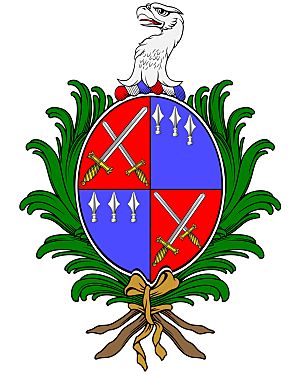John Higgins of Montoge facts for kids
Sir John Higgins (1678–1729) was an Irish doctor and a Jacobite. A Jacobite was someone who supported King James II and his family after he lost his throne. Sir John Higgins became a very important physician in Spain, serving the King and helping many people.
Contents
Sir John Higgins: A Life of Service
Early Life and Education
Sir John Higgins was born in Ireland in 1678. His family, the O'Higgins of Montiagh, were a noble Irish family. They lost their lands in Sligo around 1649. His father, Dr. Patrick Higgins, was a doctor from Limerick City.
After the Treaty of Limerick in 1691, John Higgins and his family left Ireland. They went to live in France with King James II, who was in exile. In 1700, John became a Doctor of Medicine from the University of Montpellier. He continued his studies in Paris and Holland. In 1703, he moved to Spain. There, he worked as a medical officer for the French and Spanish armies.
A Doctor in Spain
In 1712, John Higgins married the daughter of John Baptiste de Courtiade. He was the town doctor of Bayonne. In 1714, Higgins worked very hard to help soldiers during the Siege of Barcelona.
By 1717, he received the highest medical job in Spain. This was the office of Proto-médico de Camera, meaning Chief Royal Physician. The next year, he became President of the Royal Academy of Medicine and Surgery of Seville. He was the Chief Physician to King Philip V from 1713 until he died in 1729.
Helping His Countrymen
Sir John Higgins remained a good friend to Ireland and the Irish people living in Spain. When war started with England in 1718, he played a key role. He helped stop the Spanish government from taking away the goods and property of Irish merchants.
Royal Recognition and Legacy
In 1721, the French Ambassador to Spain became very ill. King Philip V sent Higgins to care for him, and the Ambassador recovered. In 1722, King Philip V of Spain gave Higgins the title of Councillor of Castille. This was a very important position in the Spanish government.
In 1724, James III, the son of King James II, made him a Knight and Baronet. This was to thank him for his services to France. Sir John Higgins died in Seville in 1729, when he was 51 years old. His children and grandchildren continued to live in Spain. In his will, he made sure his widowed mother in Limerick was cared for. He also left money for the poor people of Limerick.
 | Jackie Robinson |
 | Jack Johnson |
 | Althea Gibson |
 | Arthur Ashe |
 | Muhammad Ali |


